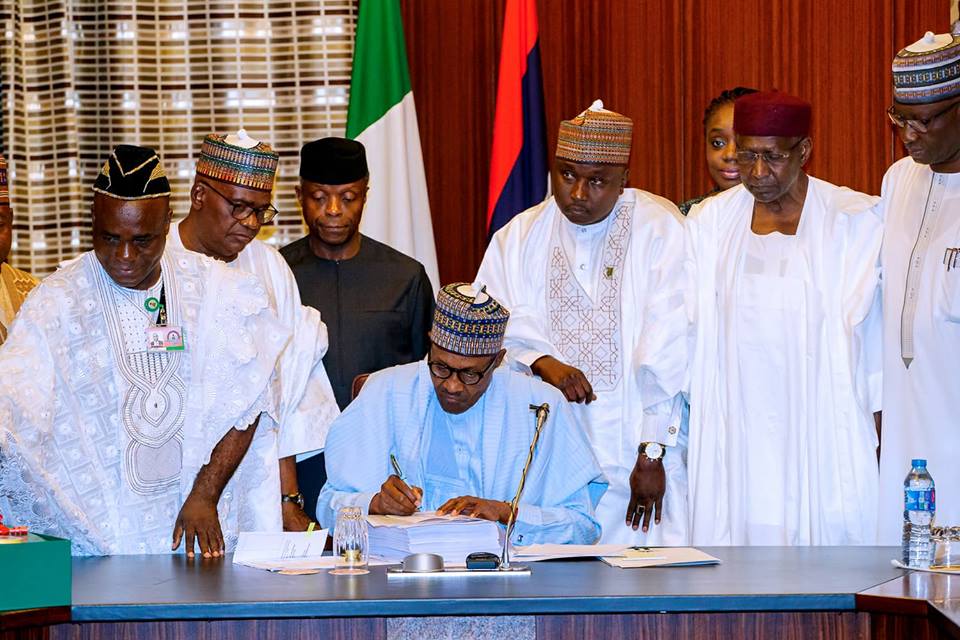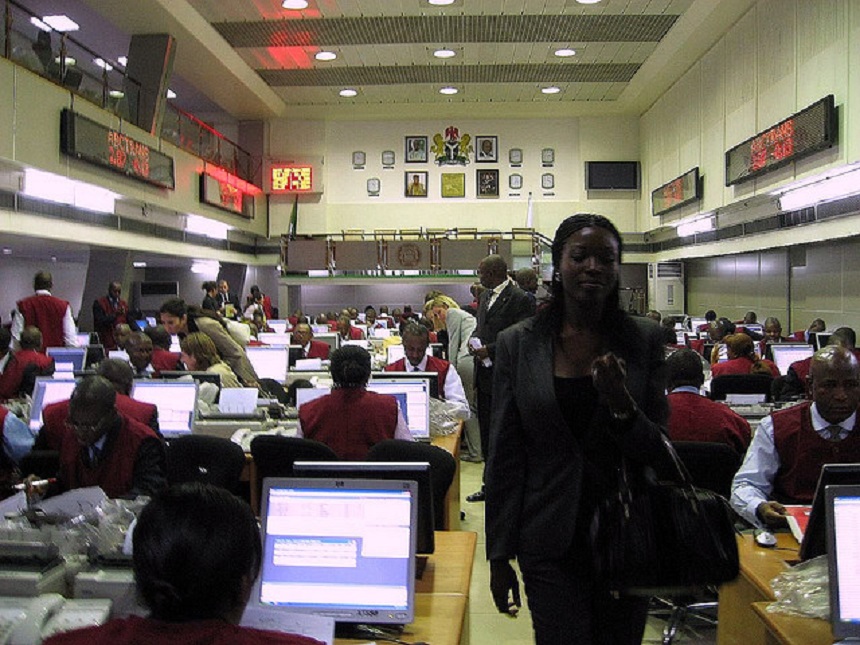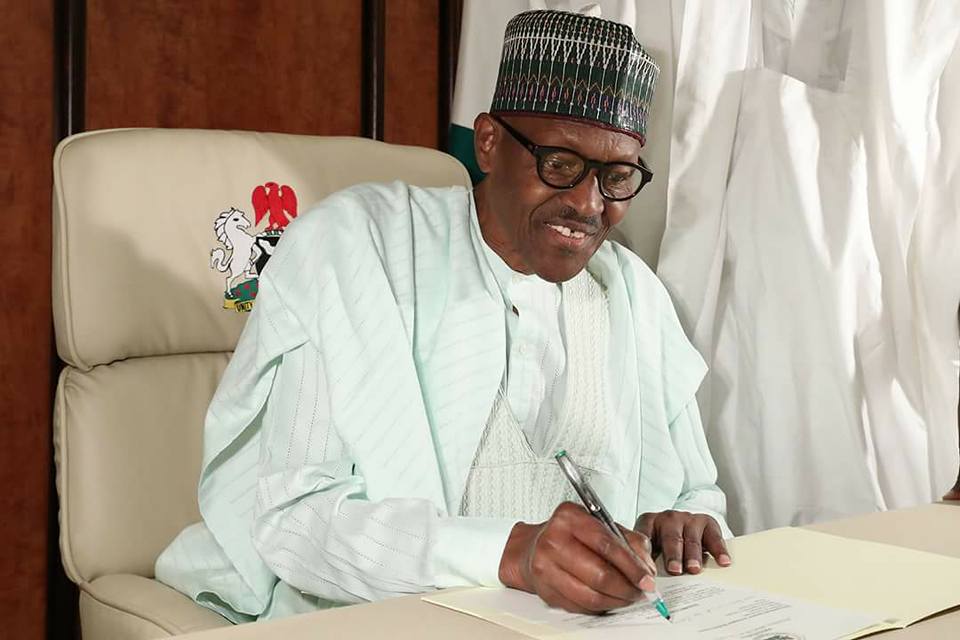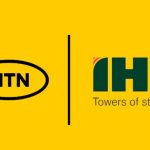Economy
I Was Forced to Sign 2018 Budget to Save Nigeria’s Economy—Buhari

By Dipo Olowookere
President Muhammadu Buhari on Wednesday finally signed the 2018 Appropriation Bill into law six months after he presented it to the National Assembly.
Mr Buhari had submitted the 2018 budget to the parliament in November 2017, but it was eventually passed by the legislative arm of government in May 2018.
The delay in the passage of the bill had generated reactions from various quarters of the country because of the effect it had on the economy in general.
Today, the President signed the budget into law after receiving it from the National Assembly nearly a month ago.
During the briefing signing ceremony on Wednesday at the Presidential Villa in Abuja, President Buhari said he was not happy with the increment made to the budget estimate by the legislature.
Mr Buhari had presented a budget of N8.6 trillion, but the lawmakers increased it to N9.1 trillion, 22.6 percent higher than the 2017 budget.
Reacting to this in his speech today, the President said the executive was never consulted before this increment was made by the parliament.
The President said if not for the fact he did not want the nation’s economy to suffer, he would probably have not signed the budget into law today.
He accused the parliament of removing some critical projects the executive put in the budget to have positive effect on Nigerians.
“I have decided to sign the 2018 budget in order not to further slowdown the pace of recovery of our economy, which has doubtlessly been affected by the delay in passing the budget,” the President said in his short speech.
According to him, “We intend to use the 2018 budget to consolidate the achievements of previous budgets and deliver on Nigeria’s Economic Recovery and Growth Plan (ERGP) 2017-2020.
“It is in this regard that I am concerned about some of the changes that the National Assembly has made to the budget proposals that I presented. The logic behind the Constitutional direction that budgets should be proposed by the Executive is that, it is the Executive that knows and defines its policies and projects.
“Unfortunately, that has not been given much regard in what has been sent to me. The National Assembly made cuts amounting to N347 billion in the allocations to 4,700 projects submitted to them for consideration and introduced 6,403 projects of their own amounting to N578 billion.
“Many of the projects cut are critical and may be difficult, if not impossible, to implement with the reduced allocation. Some of the new projects inserted by the National Assembly have not been properly conceptualized, designed and cost and will therefore be difficult to execute.”
The President listed some of the critical projects cut by the legislature as “The provisions for some nationally/regionally strategic infrastructure projects such as Counter-part funding for the Mambilla Power Plant, Second Niger Bridge/ancillary roads, the East-West Road, Bonny-Bodo Road, Lagos-Ibadan Expressway and Itakpe-Ajaokuta Rail Project were cut by an aggregate of N11.5 billion.
“Similarly, provisions for some ongoing critical infrastructure projects in the FCT, Abuja especially major arterial roads and the mass transit rail project, were cut by a total of N7.5 billion.
“The provision for Rehabilitation and Additional Security Measures for the United Nations Building by the FCT, Abuja was cut by N3.9 billion from N4 billion to N100 million; this will make it impossible for the Federal Government of Nigeria to fulfil its commitment to the United Nations on this project.
“The provisions for various Strategic Interventions in the health sector such as the upgrade of some tertiary health institutions, transport and storage of vaccines through the cold chain supply system, provision of anti-retroviral drugs for persons on treatment, establishment of chemotherapy centres and procurement of dialysis consumables were cut by an aggregate amount of N7.45 billion.
“The provision for security infrastructure in the 104 Unity Schools across the country were cut by N3 billion at a time when securing our students against acts of terrorism ought to be a major concern of government.
“The provision for the Federal Government’s National Housing Programme was cut by N8.7 billion.
“At a time when we are working with Labour to address compensation-related issues, a total of N5 billion was cut from the provisions for Pension Redemption Fund and Public Service Wage Adjustment.
“The provisions for Export Expansion Grant (EEG) and Special Economic Zones/Industrial Parks, which are key industrialization initiatives of this Administration, were cut by a total of N14.5 billion.
“The provision for Construction of the Terminal Building at Enugu Airport was cut from N2 billion to N500 million which will further delay the completion of this critical project.
“The Take-off Grant for the Maritime University in Delta State, a key strategic initiative of the Federal Government, was cut from N5 billion to N3.4 billion.
“About seventy (70) new road projects have been inserted into the budget of the Federal Ministry of Power, Works and Housing. In doing so, the National Assembly applied some of the additional funds expected from the upward review of the oil price benchmark to the Ministry’s vote.
“Regrettably, however, in order to make provision for some of the new roads, the amounts allocated to some strategic major roads have been cut by the National Assembly.”
In his conclusion, Mr Buhari thanked the “Ministers of Budget and National Planning, the Budget Office of the Federation, and everyone who worked tirelessly and sacrificed so much to bring us to this day. However, the job is only partly done.”
He said, “I am sure you will remain committed to advancing our Change Agenda, not only in the preparation of the national budget, but also in ensuring its effective implementation.”
Economy
Nigerian Stocks Give up 0.47% to Profit-taking

By Dipo Olowookere
The Nigerian Exchange (NGX) Limited suffered a 0.47 per cent decline on Tuesday a day after hitting all-time highs in its key performance barometers.
This was influenced by profit-taking in Nigerian stocks, as investors cashed out from the gains recorded in the past trading sessions.
According to data, the All-Share Index (ASI) was down by 899.50 points during the session to 189,362.94 points from the preceding session’s 190,262.44 points, and the market capitalisation decreased by N577 billion to N121.553 trillion from the N122.130 trillion achieved a day earlier.
Business Post reports that the sell-offs were intense yesterday as four of the sectors tracked ended in the red.
The consumer goods space improved by 2.54 per cent, but this was not enough to save Customs Street from crumbling when market activity ended at 2:30 pm.
The banking index was down by 3.69 per cent, the insurance space tumbled by 0.57 per cent, the industrial goods counter depleted by 0.50 per cent, and the energy sector dipped 0.06 per cent.
Despite the loss, the market breadth index remained positive after the bourse closed with 44 price gainers and 40 price losers, implying strong investor sentiment.
The trio of Mecure, SAHCO, and Zenith Bank gave up 10.00 per cent each to trade at N93.60, N117.00, and N80.55 apiece, while RT Briscoe depreciated by 9.95 per cent to N14.12, and Tripple G crashed by 9.77 per cent to N6.00.
Conversely, ABC Transport zoomed off by 9.94 per cent to N9.07, Zichis jumped 9.93 per cent to N13.06, Red Star Express appreciated by 9.87 per cent to N29.50, Meyer grew by 9.81 per cent to N22.95, and Japaul increased by 9.78 per cent to N3.03.
As for the activity chart, investors traded 1.2 billion stocks worth N60.2 billion in 86,607 deals compared with the 1.1 billion stocks valued at N64.0 billion transacted in 64,821 deals on Monday, representing a fall in the trading value by 5.94 per cent, and a surge in the trading volume and number of deals by 9.09 per cent and 33.61 per cent apiece.
Access Holdings ended the session as the busiest equity after the sale of 103.5 million units for N2.7 billion, Zenith Bank traded 93.1 million units valued at N8.0 billion, Japaul transacted 73.8 million units for N223.6 million, First Holdco exchanged 54.3 million units worth N2.6 billion, and Secure Electronic Technology sold 45.9 million units valued at N83.3 million.
Economy
Naira Trades N1,390/$1 at Parallel Market, N1,335/$1 at Official Market

By Adedapo Adesanya
It was another wonderful day for the Nigerian Naira in the different segments of the foreign market (FX) market on Tuesday, February 17, as it appreciated against the United States Dollar at the close of business.
In the parallel market, it improved its value on the greenback by N30 to sell for N1,390/$1 compared with the previous day’s rate of N1,420/$1, and at the GTBank forex desk, it gained N4 to trade at N1,363/$1 versus the preceding session’s N1,367/$1.
As for the official market, which is known as the Nigerian Autonomous Foreign Exchange Market (NAFEX), the local currency gained N11.82 or 0.88 per cent to close at N1,335.96/$1 versus Monday’s price of N1,347.78/$1.
In the same segment of the market, the domestic currency chalked up N32.43 against the Pound Sterling to finish at N1,806.75/£1 compared with the previous day’s N1,839.18/£1, and gained N18.82 on the Euro to close at N1,579.24/€1 compared with the N1,598.06/€1 it was traded a day earlier.
Improved foreign exchange supply levels following recent high demand pressures helped to sustain the currency’s advance. A portion of the delayed demand was eliminated with licensed Bureau De Change (BDC) businesses fully helping to alleviate any development.
While other supply sources, including exporters, non-bank corporations, and other market actors, pause stoked pressures on the exchange rate, their presence is anticipated to increase liquidity and flow.
Foreign reserves were last reported at $47.80 billion after appreciating by $135.75 million. The build-up in reserves has been supported by favourable external conditions, including stronger oil-related inflows and improved FX market stability.
The market is looking forward to a rate cut when the Monetary Policy Committee (MPC) meets next week after inflation decelerated further to 15.10 per cent.
Meanwhile, the cryptocurrency market was down as software stocks continued to plunge, creating a ripple effect on the digital assets.
Market analysts noted that consolidation is expected as crypto searches for a new narrative strong enough to pull capital back from AI stocks and commodities.
Litecoin (LTC) declined by 1.8 per cent to $53.99, Bitcoin decreased by 1.7 per cent to $67,446.46, Cardano (ADA) dropped 1.5 per cent to trade at $0.2810, Binance Coin (BNB) slumped 1.4 per cent to $617.60, Solana (SOL) depreciated by 0.9 per cent to $84.97, Ripple (XRP) shrank by 0.7 per cent to $1.47, and Dogecoin (DOGE) went down by 0.04 per cent to $0.1005.
On the flip side, Ethereum (ETH) appreciated by 0.2 per cent to $1,992.22, while the US Dollar Tether (USDT) and the US Dollar Coin (USDC) remained unchanged at $1.00 apiece.
Economy
Oil Dips 2% Amid Progress in US-Iran Nuclear Talks

By Adedapo Adesanya
Oil was down by about 2 per cent on Tuesday on hopes tensions between the United States and Iran were easing after Iran’s foreign minister said the countries had reached an understanding regarding nuclear talks.
Brent futures fell $1.23 or 1.8 per cent to $67.42 a barrel, and the US West Texas Intermediate (WTI) futures slipped 56 cents or 0.9 per cent to $62.33 per barrel.
According to Iranian Foreign Minister, Mr Abbas Araqchi, his country and the United States reached an understanding on the main “guiding principles” in a second round of indirect talks in Geneva, Switzerland, over their nuclear dispute on Tuesday.
However, this does not mean a deal is imminent.
Iran’s supreme leader said on Tuesday that any US attempt to depose his government would fail as the US continued a military buildup exercise in the Middle East.
Iran will close parts of the critical oil shipping lane in the Middle East, the Strait of Hormuz, for a few hours on Tuesday as it is conducting military drills in the area. The government said the partial closure is due to security precautions.
The Strait of Hormuz, the narrow lane between Iran and Oman, is the world’s most critical oil transit chokepoint, and the oil market has time and again feared Iran could attempt to close the lane. In 2024, oil flow through the strait averaged 20 million barrels per day, or the equivalent of about 20 per cent of global petroleum liquids consumption.
Iran and fellow Organisation of the Petroleum Exporting Countries (OPEC) members Saudi Arabia, United Arab Emirates, Kuwait and Iraq export most of their crude via the Strait, mainly to Asia.
Negotiators from Ukraine and Russia concluded the first of two days of US-mediated peace talks in Geneva on Tuesday, with US President Donald Trump pressing Ukraine to act fast to reach a deal to end the four-year conflict.
Meanwhile, Ukraine continued its attacks on Russian energy infrastructure. Its military said on Tuesday it struck the Ilsky refinery, while a drone attack was also reported at the port of Taman.
A peace resolution could see a lifting of sanctions on Russia, bringing Russian oil back to the mainstream market. In 2025, Russia was the third-biggest crude producer in the world behind the United States and Saudi Arabia.
-

 Feature/OPED6 years ago
Feature/OPED6 years agoDavos was Different this year
-
Travel/Tourism10 years ago
Lagos Seals Western Lodge Hotel In Ikorodu
-

 Showbiz3 years ago
Showbiz3 years agoEstranged Lover Releases Videos of Empress Njamah Bathing
-

 Banking8 years ago
Banking8 years agoSort Codes of GTBank Branches in Nigeria
-

 Economy3 years ago
Economy3 years agoSubsidy Removal: CNG at N130 Per Litre Cheaper Than Petrol—IPMAN
-

 Banking3 years ago
Banking3 years agoSort Codes of UBA Branches in Nigeria
-

 Banking3 years ago
Banking3 years agoFirst Bank Announces Planned Downtime
-

 Sports3 years ago
Sports3 years agoHighest Paid Nigerian Footballer – How Much Do Nigerian Footballers Earn













